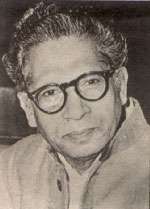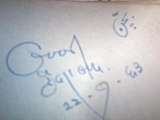Harivansh Rai Bachchan
| Harivansh Rai Bachchan | |
|---|---|
 | |
| Born |
Harivansh Rai Srivastava 27 November 1907 Allahabad, United Provinces of Agra and Oudh, British India (present-day Uttar Pradesh, India) |
| Died |
18 January 2003 (aged 95) Mumbai, Maharashtra, India |
| Pen name | Bachchan |
| Occupation | Poet, writer |
| Language | Awadhi dialect, Hindi |
| Nationality | Indian |
| Citizenship |
British (b. 1907-1948) Indian (1948-d. 2003) |
| Alma mater |
Allahabad University Cambridge University |
| Notable awards | Padma Bhushan in 1976 |
| Spouse |
Shyama Bachchan (1926–d. 1936; her death) Teji Bachchan (1941–d. 2003; his death) |
| Children | 2 (Amitabh Bachchan and Ajitabh Bachchan)[1] |
| Relatives | See Bachchan family |
|
| |
| Signature |
 |
Harivansh Rai Srivastava (27 November 1907 – 18 January 2003), known by his pet name Bachchan, was an Indian poet of the Nayi Kavita literary movement (romantic upsurge) of early 20th century Hindi literature. Born in a Hindu Awadhi Indian Srivastava Kayastha family, in Allahabad in the United Provinces of Agra and Oudh, in British India, he was also a poet of the Hindi Kavi Sammelan. He is best known for his early work Madhushala (मधुशाला).[2] He is also the husband of social activist, Teji Bachchan, father of Amitabh Bachchan and grandfather of Abhishek Bachchan. In 1986, he received the Padma Bhushan in 1976 for his service to Hindi literature.[3]
Early life
Bachchan was the eldest son of Pratap Narayan Shrivastav and Saraswati Devi. His ancestral village was Babupatti in the Pratapgarh district, in the United Provinces of Agra and Oudh, in British India (present-day Uttar Pradesh, India).
He was called "bachchan" (meaning "Kid") at home. He received his formal schooling in a municipal school and followed the family tradition of attending Kayastha Paathshaalas (कायस्थ पाठशाला) to learn Urdu as the first step to a career in law.
He later studied at Allahabad University and Banaras Hindu University. In this period, he came under the influence of the independence movement, then under the leadership of Mahatma Gandhi.
From 1941 to 1952 he taught in the English Department at the Allahabad University and after that he spent the next two years at St Catharine's College, Cambridge, Cambridge University completing a PhD on W.B. Yeats.[2] He began using "Bachchan" instead of Srivastava. After returning to India he again took to teaching and also served at All India Radio, Allahabad.[2]
In 1926, at the age of 19, Bachchan married his first wife, Shyama, who was then 14 years old. However she died ten years later in 1936 after contracting tuberculosis. Bachchan married Teji Bachchan in 1941. They had two sons, Amitabh Bachchan and Ajitabh Bachchan.
Writing career
In 1955, Bachchan shifted to Delhi to join the External Affairs Ministry and during ten years there he engaged with the evolution of Hindi as India's official language.
He also enriched Hindi through his translations of major writings. As a poet he is known for his poem Madhushala (a bar selling alcoholic drinks). Besides Omar Khayyam's Rubaiyat, he wrote Hindi translations of Shakespeare's Macbeth and Othello and the Bhagvad Gita. In November 1984 he wrote his last poem 'Ek November 1984' on Indira Gandhi's assassination.
Bachchan was nominated to the Indian Rajya Sabha in 1966 and the Government awarded him the Sahitya Akademi three years later. In 1976 he received the Padma Bhushan for his contribution to Hindi literature. He was also honoured with the Saraswati Samman for his four volume autobiography, Kya Bhooloon Kya Yaad Karoon, Needa Ka Nirman Phir, Basere Se Door and Dashdwar se Sopan Tak.[4] the Sovietland Nehru Award and the Lotus Award of the Afro-Asian writers' conference.
Bachchan died on 18 January 2003, at the age of 95, as a result of various respiratory ailments.[5] His wife Teji died in December 2007 at the age of 93.
Self-description
Bachchan used to introduce himself like this:
| “ | Mitti ka tan, masti ka man, kshan-bhar jivan– mera parichay. (मिट्टी का तन, मस्ती का मन, क्षण भर जीवन, मेरा परिचय) (A body of clay, a mind full of play, a life of a moment – that's me)[2] |
” |
Works used in movies
Bachchan's work has been used in movies and music. Examples include:
- "Rang Barse", a famous Holi song from Hindi movie Silsila (film) starring his son Amitabh Bachchan
- Couplets of his work "Agneepath" are used throughout in the movie Agneepath (1990 film) again starring Amitabh Bachchan and later in the remake Agneepath (2012 film)[6]
- Manna Dey sang the musical version of Madhushala
- 'Koi Gata Main So Jata', a song from the movie Alaap sung by K. J. Yesudas starring his son Amitabh Bachchan
List of works
|
|
|
References
- ↑ Harivansh Rai Bachchan, R (2001). In the Afternoon of Time: An Autobiography. Penguin books. p. 327.
When we entered Amit for school, we adopted 'Bachchan' as our family name, registering him as 'Amitabh Bachchan'; and when our second son was born, he was called 'Ajitabh Bachchan'
- 1 2 3 4 Harivanshrai Bachchan, 1907–2003 Obituary, Frontline, (The Hindu), 1–14 February 2003.
- ↑ "Padma Awards" (PDF). Ministry of Home Affairs, Government of India. 2015. Archived from the original (PDF) on 15 November 2014. Retrieved July 21, 2015.
- ↑ "Saraswati Samman, 1991: Harivansh Rai 'Bachchan'" (PDF). K.K. Birla Foundation. Retrieved 2014-09-23.
- ↑ "South Asia | Thousands mourn poet Bachchan". BBC News. 19 January 2003. Retrieved 26 February 2013.
- ↑ https://www.imdb.com/name/nm0045394/
- ↑ In the Afternoon of Time: An Autobiography: Harivansh Rai Bachchan, Rupert Snell, Baccana, Harivansh Rai BacHChhan: 9780670881581: Amazon.com: Books. Amazon.com. 1 April 1998. ASIN 0670881589.
External links
- मधुशाला का मूल पाठ (विकीस्रोत पर)
- हरिवंश राय बच्चन (हिन्दी विकीपीडिया पर)
- मधुशाला (हिन्दी विकीपीडिया पर)
- हरिवंश राय बच्चन (विकीस्रोत पर)
- A Collection
Further reading
- Kaveendra, Anil Pushker. Harivanshrai Bachchan Ki Anuvad Drishti (Hindi) (Hardcover) (2013). Ruby Press & Co., New Delhi. ISBN 978-93-82395-20-1